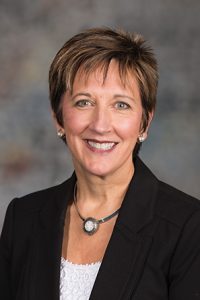Requirement for correctional overcrowding emergency plan advanced
The state Department of Correctional Services would be required to develop an accelerated release plan for inmates under a bill advanced by the Legislature March 29.

Introduced by Lincoln Sen. Patty Pansing Brooks, LB841 calls for an accelerated release plan to go into effect if the department is operating at 140 percent of capacity on July 1, 2020. The plan would remain in place until the inmate population reaches 125 percent of capacity.
Pansing Brooks said a 2017 report by the inspector general of the Nebraska Correctional System showed that Nebraska has the second highest rate of prison overcrowding in the country behind only Alabama. The average daily population of Nebraska’s correctional system is 5,343 inmates, she said, which is 155 percent higher than its design capacity of 3,435 inmates.
“We must take action now to ensure individuals are released back into the community in a way that keeps all of our citizens safe should an overcrowding emergency become necessary,” she said.
The plan would provide a process for the department director to certify that an overcrowding emergency exists, prepare and submit a list of parole-eligible inmates to be considered for accelerated release and develop a process by which the board of parole would examine inmates for potential release.
The department’s plan must be delivered to the Legislature no later than Dec. 1, 2018.
A Judiciary Committee amendment incorporated into the bill provisions of several additional bills:
• LB366, introduced by Hastings Sen. Steve Halloran, which would change the name of the Office of Parole Administration to the Division of Parole Supervision and place the division within the Board of Parole;
• LB692, introduced by Bellevue Sen. Carol Blood, which would direct the department to complete a comprehensive analysis of its system-wide staffing needs and provide a report to the Legislature by Sept. 15, 2020 and every six years thereafter;
• LB852, introduced by Lincoln Sen. Kate Bolz, which would authorize the department to allow an inmate to temporarily leave a facility to participate in substance abuse treatment, attend rehabilitative programming or seek residency or employment; and
• LB932, introduced by Omaha Sen. Sara Howard, which would require the department’s medical director to establish a protocol for determining whether an inmate soon to be released should be prescribed and dispensed a medication-assisted treatment to reduce or eliminate an inmate’s use of opiates upon release.
Howard spoke in support of the committee amendment, which included provisions of her LB932. There is a dearth of substance abuse services and providers in Nebraska, she said, so it is important to help inmates control cravings for opioids while locating and securing those services.
“Offering inmates about to be released the opportunity for a discharge protocol around medication-assisted therapy gives inmates the opportunity to not have those cravings for at least a month while they find the substance abuse assistance they need,” Howard said.
Crete Sen. Laura Ebke introduced an amendment to the committee amendment, adopted 37-0 March 27, which removed the following bills from the committee amendment:
• LB816, introduced by Omaha Sen. Ernie Chambers, which would authorize the Nebraska State Patrol to investigate allegations of criminal misconduct within the department;
• LB853, introduced by Bolz, which would authorize the department to continue contracting with counties to house state inmates in county jail facilities;
• LB868, introduced by Pansing Brooks, which would require the Board of Parole to provide the department and an inmate with notice within 10 days when an inmate has been deferred parole; and
• LB1118, introduced by Omaha Sen. Bob Krist, which would create a coordinated reentry council.
Ebke said the governor, state Department of Correctional Services and Board of Parole had expressed concerns about these bills and recommended removing them to ensure the passage of the others in the amendment.
She said the best way to ensure lasting success in the operation of the state’s criminal justice system is for all branches of government to work cooperatively.
“This will move us forward by implementing a number of recommendations by our own oversight committees, while ensuring that we as legislators can work with the agencies affected,” she said.
Krist objected to the removal of the four bills in the Ebke amendment. He said each bill directly addressed issues identified by various special investigative and oversight committees.
Krist urged lawmakers to act independently and with expediency to address an inevitable prison overcrowding emergency.
“Every item we identified as a critical decision point … came out of the studies that this Legislature has put together over the last seven years,” he said. “No, we do not need the permission of anybody outside this chamber to do something.”
Echoing that sentiment was Columbus Sen. Paul Schumacher. He said senators must be forceful when state agencies fail to comply with legislative directives, whether intentionally or not.
“We struggled with several bills in the past to try and limit the use of solitary confinement, much to no avail,” Schumacher said. “When institutions do not want to comply, it’s really hard unless you’re really aggressive as a Legislature to make them comply.”
Following the 32-0 adoption of the committee amendment March 29, senators voted to advance the bill to select file on a 37-1 vote.


